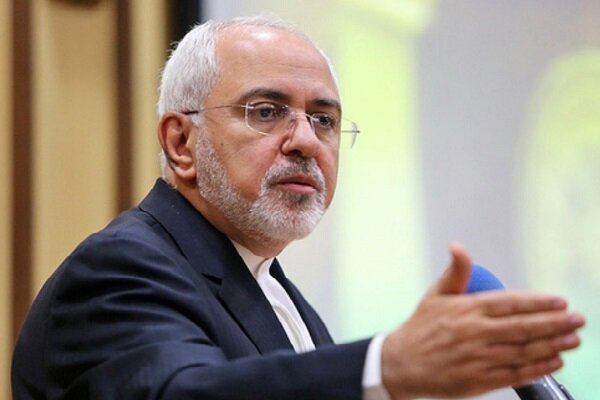Zarif to EU: Uphold your obligations instead of asking Iran to unilaterally honor JCPOA

TEHRAN – Iranian Foreign Minister Mohammad Javad Zarif on Thursday criticized the European Union for their reaction to Tehran’s ultimatum on preserving the nuclear deal, aka Joint Comprehensive Plan of Action (JCPOA).
On Wednesday, May 8, Iran announced it will suspend part of its obligations under the JCPOA in retaliation for the U.S. exit from the nuclear agreement and a failure by the EU to redress the effects of sanctions on the Iranian people. Iran said the EU has just 60 days to sit for negotiations to put the JCPOA on its right track otherwise it will take the next steps.
The measure by Iran took place exactly a year after President Donald Trump pulled the U.S. out of the multilateral accord and ordered sanctions on Iran.
“EU statement today is why JCPOA is where it is: the U.S. has bullied Europe—and rest of world—for a year and the EU can only express ‘regret’,” Zarif wrote on his Twitter page.
Zarif added, “Instead of demanding that Iran unilaterally abide by a multilateral accord, EU should uphold obligations – including normalization of economic ties.”
Zarif’s tweet came after the three European countries signatory to the JCPOA – Britain, France, and Germany (E3) - and the EU, represented by its chief diplomat Federica Mogherini, rejected Iranian ultimatums over the landmark deal, in a sign of the deepening crisis engulfing the accord.
They warned Tehran on Thursday over its threat the previous day to revive its atomic program, a response that highlighted anxiety in European capitals over the risk of the deal collapsing.
“We reject any ultimatums and we will assess Iran’s compliance on the basis of Iran’s performance regarding its nuclear-related commitments,” a joint European statement said.
Emmanuel Macron, the French president, said he hoped “very deeply” that Iran would remain in the accord. “We need to maintain it, Iran must stay within this deal — and we will do everything we can to make sure it stays,” he told reporters.
Under the agreement endorsed by the UN Security Council Resolution 2231 in July 2015, Iran accepted curbs on its nuclear program in exchange for termination of economic and financial sanctions.
This month, Trump stopped waiving sanctions on Iranian oil as part of his efforts to maximize pressure on Tehran.
The Europeans said they would monitor the findings of regular International Atomic Energy Agency reviews of whether Iran was honoring its obligations under both the nuclear agreement and the Treaty on the Non-Proliferation of Nuclear Weapons.
As the U.S conducts a “maximum pressure” campaign against Tehran, Trump on Wednesday announced new measures targeting Iranian metal exports. He warned Tehran could “expect further actions unless it fundamentally alters its conduct”.
When asked on Thursday if U.S. military action against Iran was an option, Trump replied: “I guess you could say that always.” He added that he would “like Iran to call me”.
On Wednesday Iranian President Hassan Rouhani announced Tehran would take two steps relating to enriched uranium and the heavy water involved in enrichment that means it is no longer implementing certain commitments in the 2015 accord.
On Wednesday, Zarif said limiting Iran’s level of commitment to the nuclear deal does not mean that the deal is dead, but warned Europe that they have a “narrowing window” of diplomacy to save the deal.
The Europeans said they regretted the U.S. reimposition of sanctions last year, adding that they would continue with efforts to support “legitimate trade with Iran”.
One such effort is a new company, INSTEX, created by France, Germany, and the UK to enable commercial activity with the Islamic Republic despite U.S. sanctions. The Europeans had vowed to install INSTEX in the fall of 2018, but it is not yet operational and is expected initially to focus only on a narrow range of humanitarian trade exempted from U.S. sanctions.
The EU and E3 called on countries outside the deal not to hamper efforts being made to save it by the remaining parties, which also include Russia and China.
European officials say Iran’s tougher stance has left room for diplomacy, as it gives time to respond and threatens only a partial renewal of nuclear activity rather than a wholesale repudiation of the deal.
SP/PA
